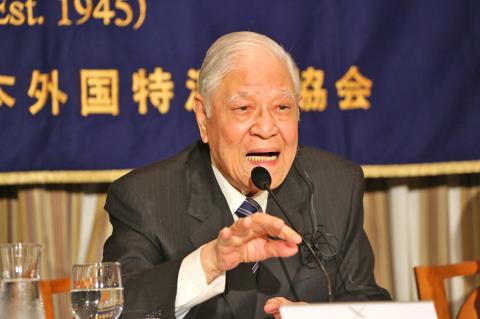Former president Lee Teng-hui (李登輝) held one-and-a-half-hour talks with with Japanese Prime Minister Shinzo Abe yesterday at a hotel near the National Diet Building, TV Tokyo Corp reported.
TV Tokyo Corp yesterday said that Abe visited Lee at the Capital Hotel Tokyu where Lee stayed, which if true, would be an unprecedented event.
The television station cited sources within the Liberal Democratic Party “with close ties to Taiwan,” and said Lee confirmed he had met Abe before he left the hotel to give a talk at the Foreign Correspondents’ Club of Japan (FCCJ) yesterday.

Photo: CNA
However, Lee Teng-hui Foundation Secretary-General Wang Yan-chun (王燕軍) later denied that Lee had met with Abe.
Wang said Abe was at the hotel to meet with someone other than Lee, Wang said, adding that further questions for details should be directed to Abe.
Responding to reporters’ questions at the FCCJ meeting, Lee said only: “I cannot say anything on having met [with Abe]. I can only say that Prime Minister Abe has contributed greatly to Japan.”
Separately, reporters from the Liberty Times (the Taipei Times’ sister newspaper), asked Lee what his thoughts were on reports that China simulated an attack on the Presidential Office Building in war games despite President Ma Ying-jeou (馬英九) administration’s China-leaning policies, and how Taiwan should pursue future relations with China.
Lee said that Taiwanese politics may see changes after the combined presidential and legislative elections on Jan. 16 next year, but that the basic line with China should be: “China is China, Taiwan is Taiwan.”
Lee added that as long as both sides could respect each other, there could be peaceful coexistence.
“We absolutely will not agree if China is pushing the ‘one China’ principle,” Lee said.
Lee strongly praised the Abe administration’s national defense bill, which would lift restrictions on Japanese troops to allow them to fight abroad for the first time since World War II, saying that the bill would contribute to peace and stability in not only Japan, but also globally.
When asked by Hong Kong reporters on his evident affection for Japan and if Taiwanese felt life was better under Japanese rule, Lee said that Japanese did not treat Taiwanese any better under its rule, but people like Japanese colonial administrator Goto Shinpei and Japanese civil engineer Yoichi Hatta had benefited Taiwan greatly.
Japan also enabled Taiwan’s rapid modernization, Lee said, adding that Taiwanese aid to Japan after the earthquake, tsunami and nuclear power plant meltdown in 2011 is symbolic of Taiwan-Japan friendship.

CHAOS: Iranians took to the streets playing celebratory music after reports of Khamenei’s death on Saturday, while mourners also gathered in Tehran yesterday Iranian Supreme Leader Ayatollah Ali Khamenei was killed in a major attack on Iran launched by Israel and the US, throwing the future of the Islamic republic into doubt and raising the risk of regional instability. Iranian state television and the state-run IRNA news agency announced the 86-year-old’s death early yesterday. US President Donald Trump said it gave Iranians their “greatest chance” to “take back” their country. The announcements came after a joint US and Israeli aerial bombardment that targeted Iranian military and governmental sites. Trump said the “heavy and pinpoint bombing” would continue through the week or as long

TRUST: The KMT said it respected the US’ timing and considerations, and hoped it would continue to honor its commitments to helping Taiwan bolster its defenses and deterrence US President Donald Trump is delaying a multibillion-dollar arms sale to Taiwan to ensure his visit to Beijing is successful, a New York Times report said. The weapons sales package has stalled in the US Department of State, the report said, citing US officials it did not identify. The White House has told agencies not to push forward ahead of Trump’s meeting with Chinese President Xi Jinping (習近平), it said. The two last month held a phone call to discuss trade and geopolitical flashpoints ahead of the summit. Xi raised the Taiwan issue and urged the US to handle arms sales to

State-run CPC Corp, Taiwan (CPC, 台灣中油) yesterday said that it had confirmed on Saturday night with its liquefied natural gas (LNG) and crude oil suppliers that shipments are proceeding as scheduled and that domestic supplies remain unaffected. The CPC yesterday announced the gasoline and diesel prices will rise by NT$0.2 and NT$0.4 per liter, respectively, starting Monday, citing Middle East tensions and blizzards in the eastern United States. CPC also iterated it has been reducing the proportion of crude oil imports from the Middle East and diversifying its supply sources in the past few years in response to geopolitical risks, expanding

An Emirates flight from Dubai arrived at Taiwan Taoyuan International Airport yesterday afternoon, the first service of the airline since the US and Israel launched strikes against Iran on Saturday. Flight EK366 took off from the United Arab Emirates (UAE) at 3:51am yesterday and landed at 4:02pm before taxiing to the airport’s D6 gate at Terminal 2 at 4:08pm, data from the airport and FlightAware, a global flight tracking site, showed. Of the 501 passengers on the flight, 275 were Taiwanese, including 96 group tour travelers, the data showed. Tourism Administration Deputy Director-General Huang He-ting (黃荷婷) greeted Taiwanese passengers at the airport and